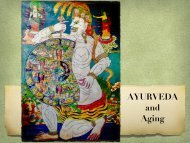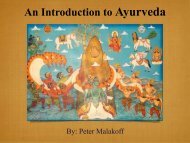A KORA OF KORAS
You also want an ePaper? Increase the reach of your titles
YUMPU automatically turns print PDFs into web optimized ePapers that Google loves.
Buddha thought it essential for human beings to get a true picture of the world
they live in (remember his hesitation about teaching) and herein lies a
fundamental difference between Buddhism and other religions in the world: the
original teachings and practice of the Buddha are realistic, based on what can be
observed, whereas every other religion in the world, in one way or another is
idealistic and based on something one needs to believe in, imagine or attain.
Every one of the great religions (Judaism, Christianity, Hinduism, Islam) asks you
to believe in or imagine something; Jesus, Krishna, Mohammed, the Divine
source of the Torah, the Bible, the Koran or Vedas, some God, heaven or hell.
Buddha not only did not ask for belief, he specifically advised against it; instead of
belief, Buddha asked a person to examine their own life and the nature of life
itself. In his last words spoken to the monks around him when he was dying he
said:
“Behold, O’ monks, this is my last advice to you. Salvation does not come from the sight of me. It
demands strenuous effort and practice. All component (put together and without self-essence)
things in the world are changlng. They are not lasting.
So work hard and seek your own salvation.”
The ‘salvation’ he refers to is release from the ‘terrible’ truth of change, old age,
illness and death. Buddha taught that such changes do not apply to the ‘self ’ or
‘Self,’ not because the ‘self ’ or ‘Self,’ can attain to some kind of heaven, but
because there is no individual self.
While it may be comforting to believe this and many people certainly do,

















